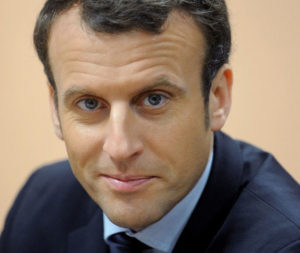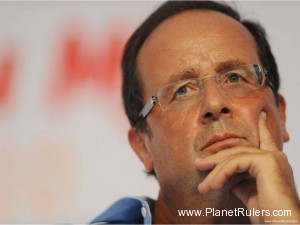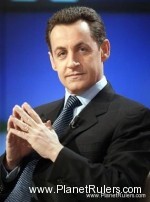Emmanuel Macron, President of France (elected on May 8, 2017 with 66% of the votes)

A member of the Socialist Party (PS) from 2006 to 2009, Macron was appointed as deputy secretary-general under François Hollande’s first government in 2012. He was appointed Minister of Economy, Industry and Digital Affairs in 2014 under the Second Valls Government, where he pushed through business-friendly reforms. He resigned in August 2016 to launch a bid in the 2017 presidential election. In November 2016, Macron declared that he would run in the election under the banner of En Marche!, a centrist political movement he founded in April 2016. Ideologically, he has been characterised as a centrist and a liberal.
Macron qualified for the runoff after the first round of the election on 23 April 2017. He easily won the second round of the presidential election on 7 May according to preliminary results, making the candidate of the National Front, Marine Le Pen, concede. At 39, he will become the youngest President in French history and the youngest French head of state since Napoleon.
Born in Amiens, Emmanuel Jean-Michel Frédéric Macron is the son of Françoise (Noguès), a physician, and Jean-Michel Macron, professor of neurology at the University of Picardy. Raised in a non-religious family, he was baptized a Roman Catholic at his own request at age 12.
He was educated mostly at the Jesuit Lycée la Providence[4] in Amiens[5] before his parents sent him to finish his last year of school at the élite Lycée Henri-IV in Paris, where he completed the high school curriculum and the undergraduate program. His parents sent him off to Paris due to their alarm at the bond he had formed with Brigitte Auzière, a married teacher with three children at Jésuites de la Providence, who later became his wife. He studied Philosophy at the University of Paris-Ouest Nanterre La Défense, obtaining a DEA degree.
Around 1999 he worked as an editorial assistant to Paul Ricoeur, the French Protestant philosopher who was then writing his last major work, La Mémoire, l’Histoire, l’Oubli. Macron worked mainly on the notes and bibliography.
He obtained a master’s degree in public affairs at Sciences Po, before training for a senior civil service career at the École nationale d’administration (ENA), graduating in 2004.
Macron is married to Brigitte Trogneux, 24 years his senior, who was his teacher in La Providence High School in Amiens. They first met when he was a 15-year-old student in her class, and she was 39, but were officially a couple only after he turned 17. His parents initially attempted to separate the couple by sending him away to Paris to finish the final year of his schooling, as they felt his youth made this relationship inappropriate, but the couple stayed together after he graduated, and they married in 2007. Macron has three stepchildren, two of whom are older than he is: Sébastien (born 1975), Laurence (born 1977), and Tiphaine (born 1984).
His best man was Henry Hermand (1924–2016), a businessman who loaned €550,000 to Macron for the purchase of his first apartment in Paris when he was Inspector of Finances. Hermand also let Macron use some of his offices on the Avenue des Champs Élysées in Paris for his movement En Marche!
Source: https://en.wikipedia.org/wiki/Emmanuel_Macron
François Hollande, Former President of France (elected on May 6, 2012)
François Gérard Georges Hollande (born 12 August 1954) is a French politician who is the President-elect of France. He also served as the First Secretary of the French Socialist Party from 1997 to 2008 and as a Deputy of the National Assembly of France for Corrèze’s 1st Constituency since 1997, and previously represented that seat from 1988 to 1993. He was the Mayor of Tulle from 2001 to 2008, and was the President of the Corrèze General Council from 2008 to 2012. He was elected as President of France on 6 May 2012, defeating the incumbent Nicolas Sarkozy.
Hollande was born in Rouen, Seine-Maritime, Upper Normandy, to a middle-class family. His mother, Nicole Frédérique Marguerite Tribert (1927–2009), was a social worker, and his father, Georges Gustave Hollande, an ear, nose, and throat doctor who “had once run for the extreme right in local politics”. The surname “Hollande” is “believed to come from Calvinist ancestors who escaped Holland (the Netherlands) in the 16th century and took the name of their old country.” Hollande was raised Catholic.
He attended Saint Jean-Baptiste de La Salle boarding school, then HEC Paris, École nationale d’administration, and the Institut d’Études Politiques de Paris (Paris Institute of Political Studies). He graduated from ENA in 1980. He lived in the United States in the summer of 1974 while he was a university student. Immediately after graduating, he was employed to work as a councillor in the Court of Audit.
After volunteering as a student to work for François Mitterrand’s ultimately unsuccessful campaign in the 1974 presidential election, Hollande joined the Socialist Party five years later. He was quickly spotted by Jacques Attali, a senior adviser to Mitterrand, who arranged for Hollande to stand for election to the French National Assembly in 1981 in Corrèze against future President Jacques Chirac, who was then the Leader of the Rally for the Republic, a Neo-Gaullist party. Hollande lost to Chirac in the first round, although he would go on to become a Special Adviser to the newly-elected President Mitterrand, before serving as a staffer for Max Gallo, the government’s spokesman. After becoming a Municipal Councillor for Ussel in 1983, he contested Corrèze for a second time in 1988, this time being elected to the National Assembly. Hollande lost his bid for re-election to the National Assembly in the so-called “blue wave” of the 1993 election, described as such due to the number of seats gained by the Right at the expense of the Socialist Party.
As the end of Mitterrand’s term in office approached, the Socialist Party was torn by a struggle of internal factions, each seeking to influence the direction of the party. Hollande pleaded for reconciliation and for the party to unite behind Jacques Delors, the President of the European Commission, but Delors renounced his ambitions to run for the French Presidency in 1995, leading to Lionel Jospin’s resuming his earlier position as the leader of the party. Jospin selected Hollande to become the official party spokesman, and Hollande went on to contest Corrèze once again in 1997, successfully returning to the National Assembly. That same year, Jospin became the Prime Minister of France, and Hollande won the election for his successor as First Secretary of the French Socialist Party, a position he would hold for eleven years. Because of the very strong position of the Socialist Party within the French Government during this period, Hollande’s position led some to refer to him the “Vice Prime Minister”. Hollande would go on to be elected the Mayor of Tulle in 2001, an office he would hold for the next seven years.
The immediate resignation of Jospin from politics following his shock defeat by far-right candidate Jean-Marie Le Pen in the first round of the 2002 presidential election forced Hollande to become the public face of the party for the 2002 legislative election but, although he managed to limit defeats and was re-elected in his own constituency, the Socialists lost nationally. In order to prepare for the 2003 Party Congress in Dijon, he obtained the support of many notable personalities of the party and was re-elected First Secretary against opposition from left-wing factions. After the triumph of the Left in the 2004 regional elections, Hollande was cited as a potential presidential candidate, but the Socialists were divided on the European Constitution, and Hollande’s support for the ill-fated “yes” position in the French referendum on the European Constitution caused friction within the party. Although Hollande was re-elected as First Secretary at the Le Mans Congress in 2005, his authority over the party began to decline from this point onwards. Eventually his domestic partner, Ségolène Royal, was chosen to represent the Socialist Party in the 2007 presidential election, where she would lose to Nicolas Sarkozy. Hollande was widely blamed for the poor performances of the Socialist Party in the 2007 elections, and he announced that he would not seek another term as First Secretary. Hollande publicly declared his support for Bertrand Delanoë, the Mayor of Paris, although it was Martine Aubry who would go on to win the race to succeed him in 2008.
Following his resignation as First Secretary, Hollande was immediately elected to replace Jean-Pierre Dupont as the President of the General Council of Corrèze in April 2008, a position he holds to this day. In 2008 he supported the creation of the first European Prize for Local History (Étienne Baluze Prize), founded by the “Société des Amis du musée du cloître” of Tulle, on the suggestion of the French historian Jean Boutier. François Hollande awarded the first prize on 29 February 2008 to the Italian historian Beatrice Palmero in the General Council of Corrèze.
Following his re-election as President of the General Council of Corrèze in March 2011, Hollande announced that he would be a candidate in the upcoming primary election to select the Socialist and Radical Left Party presidential nominee. The primary marked the first time that both parties had held an open primary to select a joint nominee at the same time. He initially trailed the front-runner, former Finance Minister and IMF Managing Director Dominique Strauss-Kahn. Following Strauss-Kahn’s arrest on suspicion of sexual assault in New York City in May 2011, Hollande began to lead the opinion polls. His position as front-runner was established just as Strauss-Kahn declared that he would no longer be seeking the nomination. After a series of televised debates throughout September, Hollande topped the ballot in the first round held on 9 October with 39% of the vote, not gaining the 50% required to avoid a second ballot, which he would contest against Martine Aubry, who had come second with 30% of the vote.
The second ballot took place on 16 October 2011. Hollande won with 56% of the vote to Aubry’s 43% and thus became the official Socialist and Radical Left Party candidate for the 2012 presidential election. After the primary results, he immediately gained the pledged support of the other contenders for the party’s nomination, including Aubry, Arnaud Montebourg, Manuel Valls and 2007 candidate Ségolène Royal.
Hollande’s presidential campaign was managed by Pierre Moscovici and Stéphane Le Foll, a Member of Parliament and Member of the European Parliament respectively. Hollande launched his campaign officially with a rally and major speech at Le Bourget on 22 January 2012 in front of 25,000 people. The main themes of his speech were equality and the regulation of finance, both of which he promised to make a key part of his campaign.
On 26 January he outlined a full list of policies in a manifesto containing 60 propositions, including the separation of retail activities from riskier investment-banking businesses; raising taxes for big corporations, banks and the wealthy; creating 60,000 teaching jobs; bringing the official retirement age back down to 60 from 62; creating subsidised jobs in areas of high unemployment for the young; promoting more industry in France by creating a public investment bank; granting marriage and adoption rights to same-sex couples; and pulling French troops out of Afghanistan in 2012. On 9 February, he detailed his policies specifically relating to education in a major speech in Orléans.
On 15 February, incumbent President Nicolas Sarkozy announced that he would run for a second and final term, strongly criticising Hollande’s proposals and claiming that he would bring about “economic disaster within two days of taking office” if he won.
In his first overseas trip for his campaign, he visited Berlin, Germany, in December 2011 for the Social Democrats Federal Party Congress, at which he met Sigmar Gabriel, Peer Steinbrueck, Frank-Walter Steinmeier and Martin Schulz; he also travelled to Belgium before the United Kingdom in February 2012, where he met with Opposition Leader Ed Miliband; and finally Tunisia in May 2012.
Opinion polls showed a tight race between the two men in the first round of voting, with most polls showing Hollande comfortably ahead of Sarkozy in a hypothetical second round run-off.
The first round of the presidential election was held on 22 April. François Hollande came in first place with 28.63% of the vote, and faced Nicolas Sarkozy in the second round run-off.
In the second round of voting on 6 May 2012, François Hollande was elected President of the French Republic with 51.7% of the vote.
For over thirty years, his partner was fellow Socialist politician Ségolène Royal, with whom he has four children – Thomas (1984), Clémence (1985), Julien (1987) and Flora (1992). In June 2007, just a month after Royal’s defeat in the French presidential election of 2007, the couple announced that they were separating.
A few months after his split from Ségolène Royal was announced, a French website published details of a relationship between Hollande and French journalist Valérie Trierweiler. This was controversial as some considered this to be a breach of France’s strict stance on the privacy of politicians’ personal affairs. In November 2007, Valérie Trierweiler confirmed and openly discussed her relationship with Hollande in an interview with French weekly Télé 7 Jours.
Source: http://en.wikipedia.org/wiki/Fran%C3%A7ois_Hollande
Nicolas Sarkozy, Former President of France
Nicolas Sarkozy was born in Paris 52 years ago, of a French mother and a father who chose to immigrate to France when his country, Hungary, was invaded by the communist Soviet Union. He grew up in Paris, then in Neuilly-sur-Seine, a suburb of Paris, where he still lives. His family taught him the values of Gaullism: love of France and the refusal of defeat.
Born January 28 1955, Paris
Family His father was a Hungarian immigrant who fled in the late 1940s and signed up for the Foreign Legion.
Education Masters degree in private law, 1978, Institute d’Études Politiques de Paris, 1979-81, barrister’s diploma, 1981
Career Barrister 1981-87; mayor, Neuilly-sur-Seine, 1983; minister of the budget 1993-94; minister of communication, 1994-95; minister of the interior and security, 2002-04; minister of the economy, finance and industry, 2004; president UMP, November 2004
On personal ambition When he was asked in a television interview whether he dreamt of being president when shaving, Sarkozy replied: “Yes – and not only when shaving.”



